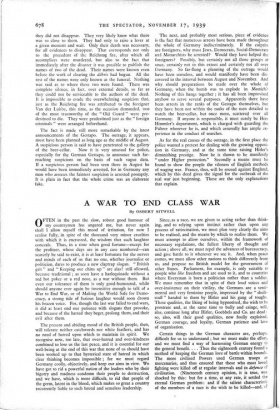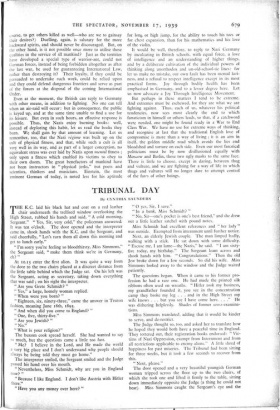A WAR TO END CLASS WAR
By OSBERT SITWELL
OFTEN in the past the slow, robust good humour of my countrymen has angered me, but never again shall I allow myself this mood of irritation, for now I realise fully, in spite of the thousand very minor cruelties with which it is encrusted, the wisdom that such laughter conceals. Thus, in a time when good fortune—except for the profiteer, whose days are in any case numbered—can scarcely be said to exist, it is at least fortunate for the nerves and minds of each of us that no one, whether journalist or politician, dares to produce a new claptrap slogan. " British grit " and " Keeping our chins up " are alas! still allowed, because traditional ; as soon have a harlequinade without a red hot poker or a red nose, as a war without them. But even our tolerance of them is only good-humoured, while should anyone ever again be insensitive enough to talk of a War to End War, or of Making the World Safe for Demo- cracy, a strong tide of furious laughter would soon drown his brazen voice. For, though the last war failed to end wars, it did at least end our patience with slogans that provoke, and because of the hatred they beget, prolong them, and their evil after them.
The present and abiding mood of the British people, then, will tolerate neither catchwords nor white feathers, and has no need of hatred upon which to maintain its spirit. We recognise now, too late, that over-hatred and over-kindness combined to lose us the last peace, and it is essential for our well-being at the end of this war that none of us should have been worked up to that hysterical state of hatred in which clear thinking becomes impossible ; for we must regard Germany coolly, objectively, and keep our aims in view. We have got to rid a powerful nation of the leaders who by their bigotry and madness condemn their people to destruction, and we have, which is more difficult, to rid that people of the germ, latent in the. blood, which makes so great a country recurrently liable to such brutal and senseless leadership. Since, as a race, we are given to acting rather than think- ing, and to relying upon instinct rather than upon any process of ratiocination, we must plan very clearly the aims to be realised, and the means by which to realise them. We must attempt to allow ourselves, within the framework of necessary regulations, the fullest liberty of thought and action ; above all, we must repel the advances of bureaucracy, and give battle to it wherever we see it. And, when peace comes, we must allow other nations to think differently from us, and propose no British model for the government of other States. Parliament, for example, is only suitable to people who like freedom and are used to it, and to countries where Everyman is born a politician rather than a soldier. We must remember that in spite of their loud voices and over-insistence on their virility, the Germans are a senti- mental and very feminine people, impressed by the " sheik- stuff " handed to them by Hitler and his gang of toughs. These qualities, the liking of being hypnotised, the wish to be prostrate and, at the same time to bully and cringe, will, alas, continue long after Hitler, Goebbels and Co. are dead: so, also, will their good qualities, now foully exploited. German courage, and loyalty, German patience and love of organisation.
Certain things in the German character are, perhaps, difficult for us to understand ; but we must make the effort, and we must find a way of harnessing German energy to the general benefit. . . . Thus the eighteenth century found a method of keeping the German love of battle within bounds. The more civilised Powers used German troops as mercenaries, and thus ensured that those who most loved fighting were killed off at regular intervals and in defence of civilisation. (Nineteenth century opinion, it is true, was shocked by this: but for a time, at any rate, it settled the eternal German problem: and if the salient characteristic of the members of a race is the wish to be killed—and, of course, to get others killed as well—who are we to gainsay their desires?) Duelling, again, is salutary for the more backward spirits, and should never be discouraged. But, on the other hand, is it not possible once more to utilise these qualities in the service of all mankind? Just as the termites have developed a special type of warrior-ant, could not German forces, instead of being forbidden altogether as after the last war, be used for guaranteeing International Law, rather than destroying it? Their loyalty, if they could be persuaded to undertake such work, could be relied upon and they could defend dangerous frontiers and serve as part of the forces at the disposal of the coming International Order.
Even at the moment, the British can reply to Germany with other means, in addition to fighting. No one can tell when an air-raid will occur: but in consequence, the public is keyed up, and at the same time unable to find a use for its leisure. But even in such hours, an effective response is possible. Thus, the Nazis enjoy burning books: well, instead of deploring this habit, let us read the books they burn. We shall gain by that amount of learning. Let us remember, too, that the Nazi regime was built up on the cult of physical fitness, and that, while such a cult is all very well in its way, and as part of a larger conception, no equivalent stress was ever laid by Nazis upon mental fitness ; only upon a fitness which enabled its victims to obey to their own doom. The great benefactors of mankind have not been instructors in " physical jerks," but poets and scientists, thinkers and musicians. Einstein, the most eminent German of today, is noted less for his aptitude for long or high jump, for the ability to touch his toes or for chest expansion, than for his mathematics and his love of the violin.
It would be well, therefore, to reply to Nazi Germany by inculcating in British schools, with equal force, a love of intelligence and an understanding of higher things, and by a deliberate cultivation of the individual powers of thinking along unorthodox and un-old-school-tie lines: for let us make no mistake, our own fault has been mental lazi- ness, and a refusal to respect intelligence except in its most practical forms. Joy through bodily health has been emphasised in Germany, and to a lesser degree here. Let us now advocate a Joy Through Intelligence Movement.
But perhaps in these matters I tend to be extreme. And extremes must be eschewed, for they are what we are fighting against. Thus, each of us, whatever his political tendencies, now sees most clearly the end to which fanaticism in himself or others leads, so that, if a catchword were needed, one might be found ready in a War to End Class War. We have no use for extreme ways of thinking, and recognise at last that the traditional English love of compromise is more than a way of living ; it is an aim in itself, the golden middle road which avoids the lies and bloodshed and torture on each side. Even our most fanatical politicians must be by now disillusioned equally with Moscow and Berlin, those two ugly masks to the same face. There is little to choose, except in daring, between thug and vulture, and we are fighting for a way of life in which thugs and vultures will no longer dare to attempt control of the fates of other beings.





































































 Previous page
Previous page